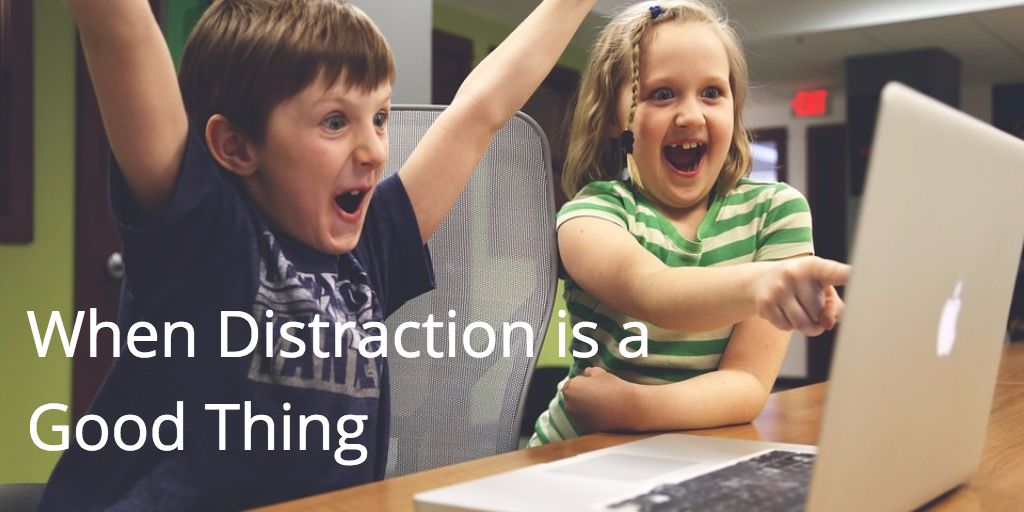Distractions Can Ease Pain Our brains have a limited ability to focus. In her book, SuperBetter: The Power of Living Gamefully, Dr. Jane McGonigal, describes how distractions can be a powerful tool for reducing the impact of painful or negative experiences. In fact, playing the virtual reality game was more effective at reducing pain than using medication. Patients who played the game were more likely to take their medications, increase their sense of self-efficacy, and show more knowledge regarding how to fight their cancer. McGonigal warns of solutions that don’t build our ability to deal with pain in the future. These distractions help us improve ourselves and can build self-efficacy. Identifying why and how you engage with personal technology may be the difference between healthy and destructive behavior. Take a look at your favorite digital distractions — social media, video games, puzzles, television shows, podcasts, news, and spectator sports — and ask yourself whether you are using them as tools to build strength, skills, knowledge, and self-efficacy for the future or for temporary escape from an uncomfortable reality. → Personal technology distractions like video games and puzzles can give us strength to endure negative experiences. → Personal technology is a healthy distraction for most people, but it can go bad when it becomes an escape from an uncomfortable reality.

Is distraction a curse or a blessing? Not giving full attention to what we should be doing makes us miss deadlines, fail classes, and crash into other drivers. Distraction certainly has a price. Nonetheless, we love our distractions! Social media, spectator sports, movies, books, TV shows, the news, video games – what would we do without them?
Clearly, there are benefits to distractions as evidenced by the fact that nearly everyone on earth seeks them out. But why? Although they seem to pull us away from more important things, what purpose do they serve? And, when at times we seem to give in to distractions, how do we ensure they serve us well?
Distractions Can Ease Pain
Our brains have a limited ability to focus. We can’t pay attention to everything around us all at once so we must choose what to focus on. For example, we may choose to focus on work while struggling to resist more interesting distractions.
However, in some situations, we can leverage this biological limitation to our advantage. In her book, SuperBetter: The Power of Living Gamefully, Dr. Jane McGonigal, describes how distractions can be a powerful tool for reducing the impact of painful or negative experiences.
For example, children are notoriously anxious before surgery. Their levels of preoperative anxiety are known to reduce the effectiveness of anesthesia and increase recovery times. Physicians need alternatives to sedative medications to keep them calm. A study, cited by McGonigal, used distractions to effectively reduce their stress.
In the study, one group of children was given anti-anxiety medication before surgery, another group played handheld video games, while a third control group was given no medication and no video games before surgery. The kids in the video game group were the only ones to show a decrease in anxiety before surgery. They also required less anesthesia during the procedure and suffered from fewer medication side effects after surgery than children in the other two groups.
The video games proved effective, researchers believe, because they distracted the children from the pain and uncertainty of the surgery. The engaging nature of the video game helped children direct their attention away from their fear and towards the challenge of the game.
This study isn’t alone in demonstrating the power of distractions to lessen negative experiences. Burn patients are typically given large doses of medications to help them through the excruciating pain of cleaning their wounds. A new virtual reality game designed by scientists at the University of Washington Seattle demonstrated the extraordinary power of distractions in fighting pain. The researchers found that patients who played the game during wound cleaning felt up to 50 percent less pain. In fact, playing the virtual reality game was more effective at reducing pain than using medication. The researchers concluded that the more immersive and engaging the game was, the more it helped direct attention away from the pain of the procedure.
Increase your focus and productivity by downloading 24 of my best brain hacks to get things done. You’ll also receive my free weekly email newsletter. Unsubscribe anytime.
Distractions Can Make Us Better
The ability to shift our attention away from negative experiences is also helpful outside of a hospital setting. Distractions can help us cope with the pains of everyday life. Research on how distractions can be used to control our urges and impulses show that certain games, like Tetris for example, can help reduce cravings for fatty foods and even addictive drugs. Researchers suspect the cognitive demands of these games redirect our attention away from craving triggers, reducing the painful urge to indulge. Playing matching puzzle games like Candy Crush, Puzzle Blocks, or Interlocked might actually help us distract ourselves away from digging into that pint of ice cream in the fridge.
Distractions can also help us stay fit. Research suggests taking our minds off the pain of physical exercise, with music or television, can improve performance and endurance.
Digital distractions and personal technology can help us be stronger in the moment, but McGonigal thinks they can also help us develop our ability to take on challenges in the future. Certain personal technologies can help us build up our courage, McGonigal says, and games are a particularly good way to boost our self-efficacy — our confidence in our ability to overcome problems.
Evidence to back McGonigal’s claim comes from…

COMMENTS